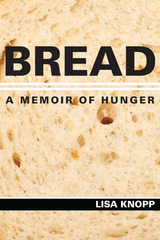
When she was 54, Lisa Knopp’s weight dropped to a number on the scale that she hadn’t seen since seventh grade. The severe food restricting that left her thin and sick when she was 15 and 25 had returned. This time, she was determined to understand the causes of her malady and how she could heal from a condition that is caused by a tangle of genetic, biological, familial, psychological, cultural, and spiritual factors. This compelling memoir, at once a food and illness narrative, explores the forces that cause eating disorders and disordered eating, including the link between those conditions in women, middle-aged and older, and the fear of aging and ageism.
Winner of the 2017 Nebraska Book Award for Memoir
2017 Choice Outstanding Academic Title
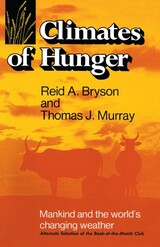
In recent years, world climate changes have drawn more attention than at any other time in history. What we once called "crazy weather," just a few years ago, is now beginning to be seen as a part of a logical and, in part, predictable pattern, an awesome natural force that we must deal with if man is to avoid disaster of unprecedented proportions.
Climates of Hunger is a book of paramount importance for our time. It will be essential reading not only for professionals in the field—including agricultural meteorologists, political scientists, geographers, sociologists, and business counselors—but for all who are concerned in any way with environmental trends, world and domestic food supplies, and their effects on human institutions.
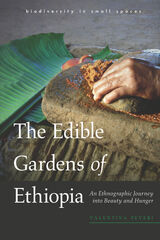
The ensete plant is only one among the many “unloved” crops that are marginalized and pushed close to disappearance by the advance of farming modernization and monocultural thinking. And yet its human companions, caught in a symbiotic and sensuous dialogue with the plant, still relate to each exemplar as having individual appearance, sensibility, charisma, and taste, as an epiphany of beauty and prosperity, and even believe that the plant can feel pain. Here a different story is recounted of these human-plant communities, one of reciprocal love at times practiced in an act of secrecy. The plot unfolds from the subversive and tasteful dimensions of gardening for subsistence and cooking in the garden of ensete through reflections on the cultural and edible dimensions of biodiversity to embrace hunger and beauty as absorbing aesthetic experiences in small-scale agriculture. Through this story, the reader will enter the material and spiritual world of ensete and contemplate it as a modest yet inspiring example of hope in rapidly deteriorating landscapes.
Based on prolonged engagement with this “virtuous” plant of southwestern Ethiopia, this book provides a nuanced reading of the ensete ventricosum (avant-)garden and explores how the life in tiny, diverse, and womanly plots offers alternative visions of nature, food policy, and conservation efforts.
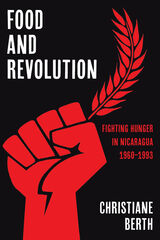

There is, literally, a world of difference between the statements "Everyone should have adequate food," and "Everyone has the right to adequate food." In George Kent's view, the lofty rhetoric of the first statement will not be fulfilled until we take the second statement seriously. Kent sees hunger as a deeply political problem. Too many people do not have adequate control over local resources and cannot create the circumstances that would allow them to do meaningful, productive work and provide for themselves. The human right to an adequate livelihood, including the human right to adequate food, needs to be implemented worldwide in a systematic way.
Freedom from Want makes it clear that feeding people will not solve the problem of hunger, for feeding programs can only be a short-term treatment of a symptom, not a cure. The real solution lies in empowering the poor. Governments, in particular, must ensure that their people face enabling conditions that allow citizens to provide for themselves.
In a wider sense, Kent brings an understanding of human rights as a universal system, applicable to all nations on a global scale. If, as Kent argues, everyone has a human right to adequate food, it follows that those who can empower the poor have a duty to see that right implemented, and the obligation to be held morally and legally accountable, for seeing that that right is realized for everyone, everywhere.

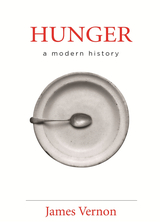
Hunger is as old as history itself. Indeed, it appears to be a timeless and inescapable biological condition. And yet perceptions of hunger and of the hungry have changed over time and differed from place to place. Hunger has a history, which can now be told.
At the beginning of the nineteenth century, hunger was viewed as an unavoidable natural phenomenon or as the fault of its lazy and morally flawed victims. By the middle of the twentieth century, a new understanding of hunger had taken root. Across the British Empire and beyond, humanitarian groups, political activists, social reformers, and nutritional scientists established that the hungry were innocent victims of political and economic forces outside their control. Hunger was now seen as a global social problem requiring government intervention in the form of welfare to aid the hungry at home and abroad. James Vernon captures this momentous shift as it occurred in imperial Britain over the past two centuries.
Rigorously researched, Hunger: A Modern History draws together social, cultural, and political history in a novel way, to show us how we came to have a moral, political, and social responsibility toward the hungry. Vernon forcefully reminds us how many perished from hunger in the empire and reveals how their history was intricately connected with the precarious achievements of the welfare state in Britain, as well as with the development of international institutions, such as the United Nations, committed to the conquest of world hunger. All those moved by the plight of the hungry will want to read this compelling book.
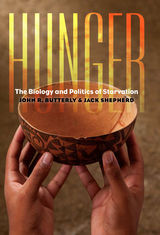
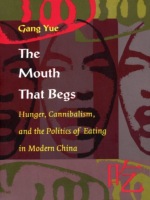
Yue’s discussion begins with a brief look at ancient Chinese alimentary writing and then moves on to its main concern: the exploration and textual analysis of themes of eating in modern Chinese literature from the May Fourth period through the post-Tiananmen era. The broad historical scope of this volume illustrates how widely applicable eating-related metaphors can be. For instance, Yue shows how cannibalism symbolizes old China under European colonization in the writing of Lu Xun. In Mo Yan’s 1992 novel Liquorland, however, cannibalism becomes the symbol of overindulgent consumerism. Yue considers other writers as well, such as Shen Congwen, Wang Ruowang, Lu Wenfu, Zhang Zianliang, Ah Cheng, Zheng Yi, and Liu Zhenyun. A special section devoted to women writers includes a chapter on Xiao Hong, Wang Anyi, and Li Ang, and another on the Chinese-American women writers Jade Snow Wong, Maxine Hong Kingston, and Amy Tan. Throughout, the author compares and contrasts the work of these writers with similarly themed Western literature, weaving a personal and political semiotics of eating.
The Mouth That Begs will interest sinologists, literary critics, anthropologists, cultural studies scholars, and everyone curious about the semiotics of food.

Objects of Hunger explores in reflective, raw lyrics the dread and beauty of our inner worlds as expressed through our struggles against the self and the other. Each poem is a slender organism that speaks its own mind, unafraid of pathos; the emotions here have been tried on and lived in, and the work accrues, lyric after lyric, page after page. In the second section, World War I poems are broken down and dismantled, as the voices of that era’s poets meld with that of a postpartum mother, exposing a shared vernacular among these disparate experiences. Other poems in the collection explore the unraveling and entrapments of the domestic, but with tenacity in place of softness, using a lexicon gathered from Virginia Woolf’s The Waves and Djuna Barnes’s Nightwood, among others.
What emerges is a finely chiseled portrait of intimacy, one that takes seriously love and all discord, the fracas of reticence and familiarity. Belli gives this world to us by way of a throbbing asceticism, in an exploration of resignation, concession, persistence, and monstrosity. This collection tells what it is to need with abandon.

Every year, millions of the rural poor suffer from predictable and preventable seasonal hunger. This hunger is less dramatic but no less damaging than the starvation associated with famines, wars and natural disasters. Seasons of Hunger explores why the world does not react to a crisis that we know will continue year after year.
Seasonal hunger is caused by annual cycles of shrinking food stocks, rising prices, and lack of income. This hidden hunger pushes millions of children to the brink of starvation every year, permanently stunting their physical and cognitive development, weakening their immune systems and opening the door for killer diseases. Action Against Hunger argue that ending seasonal hunger could save millions of young lives and is key to achieving the Millennium Development Goals. This book documents seasonal hunger in four countries - India, Malawi, Mali and Myanmar - including personal stories and country-wide data which shows the magnitude of the problem.
The authors also find encouraging examples of interventions designed to address seasonality - initiatives led by governments, donors and NGOs, and poor people themselves - and propose a package of advocacy messages that could contribute to the global eradication of seasonal hunger. This book will be a valuable resource for journalists, policy makers, NGO members and students of development studies.
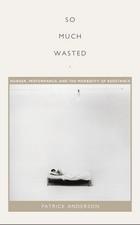
READERS
Browse our collection.
PUBLISHERS
See BiblioVault's publisher services.
STUDENT SERVICES
Files for college accessibility offices.
UChicago Accessibility Resources
home | accessibility | search | about | contact us
BiblioVault ® 2001 - 2024
The University of Chicago Press









